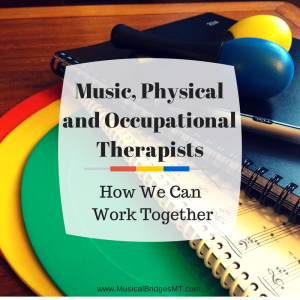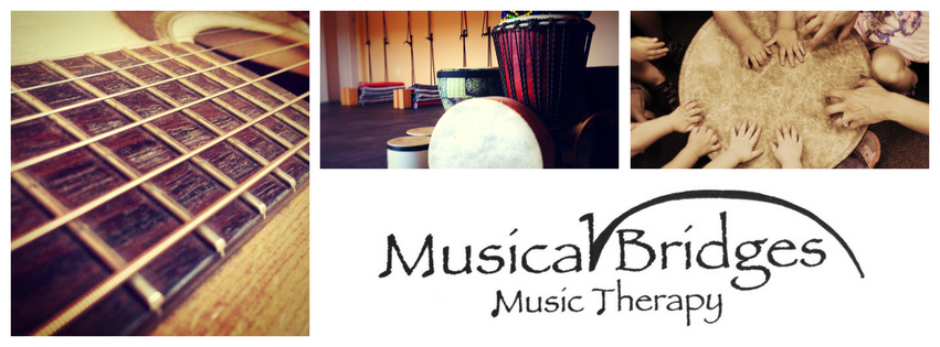 As the music therapy profession grows, so does the opportunity for collaboration among other therapists. This post will address two specific therapists in particular: physical therapists (PTs) and occupational therapists (OTs). Music therapists can (and do) work with PTs and OTs in schools, hospitals, rehabilitation and skilled nursing facilities co-treating patients/students as they work towards their therapeutic goals. Though all work towards similar goals and therapeutic outcomes, each therapist has a different specialty.
As the music therapy profession grows, so does the opportunity for collaboration among other therapists. This post will address two specific therapists in particular: physical therapists (PTs) and occupational therapists (OTs). Music therapists can (and do) work with PTs and OTs in schools, hospitals, rehabilitation and skilled nursing facilities co-treating patients/students as they work towards their therapeutic goals. Though all work towards similar goals and therapeutic outcomes, each therapist has a different specialty.
First we must distinguish between the three types of therapies:
PHYSICAL THERAPISTS:Physical therapists (PTs) are highly-educated, licensed health care professionals who can help patients reduce pain and improve or restore mobility – in many cases without expensive surgery and often reducing the need for long-term use of prescription medications and their side effects (American Physical Therapy Association, 2013).
OCCUPATIONAL THERAPISTS: occupational therapists and occupational therapy assistants help people across the lifespan participate in the things they want and need to do through the therapeutic use of everyday activities (occupations). (American Occupational Therapy Association, 2014).
MUSIC THERAPISTS: Music Therapy is the clinical and evidence-based use of music interventions to accomplish individualized goals within a therapeutic relationship by a credentialed professional who has completed an approved music therapy program (American Music Therapy Association, 2014).
Now as you look at the three definitions you may notice that the MT definition is vague in comparison to the PT and OT. The reason for this is that music therapists do not specialize in one aspect of therapy due to music’s ability to affect a variety of issues in therapy. A physical therapist is specifically trained to work towards PHYSICAL NEEDS, as an occupational therapist is trained to work towards OCCUPATIONAL or DAILY ACTIVITY NEEDS. Though a music therapist may work towards physical or occupational goals, we are not specialized in this area and certainly do not have the same knowledge as PTs and OTs in these areas. Yes, music therapists often incorporate physical and daily living goals into our treatment plans, but we implement “musical interventions” to address these goals, as using music to aid in therapy is what we are trained to do. In addition, music therapy often improves affect, motivation and distraction which can be very helpful when working on physical goals. We are specialized in the areas of MUSIC and THERAPY, which is why our interventions often compliment the more detailed and specific physical interventions set by the PT or OT. Due to the different training and skills, combining the specialities of the PT, OT and MT can result with amazing outcomes in therapy.
So how can the music therapist help in PT and OT?
Complimenting the PT/OT treatment plan with a musical component– Everyone who exercises knows that working out to music is much more exciting. It distracts the mind from how long the workout has been taking place (and often times you will workout longer!), it keeps the mind distracted from feeling fatigued and it can uplift and motivate simply by listening. So you may be thinking…”Well my iPod can play music in my therapy sessions, so why not just have the recorded music?” This is a good point and can work to some extent… however, the use of live music can be much more beneficial. A music therapist is trained in knowing how music stimulates movement in the brain and can help control tempo. This is especially helpful when working with patients suffering from brain injuries or those relearning to walk and partaking in gait training. The music therapist can aid the PT/OT who is the specialist in designing interventions to work towards the physical rehabilitation goals, by designing and providing the music to accompany these interventions to create the best possible therapeutic plan for the patient. Not only will the patient receive expertise from the PT/OT, they will be assured proper guidance in using music to help them reach their goals quicker.
This brings me to my next point…
Music may have unwanted effects if one does not understand how to use it. As stated in previous posts, music affects the brain in a variety of ways. Music is a very strong stimulus to the brain and if one does not understand the implications and contraindications of using music in therapy, the treatment may 1) be less effective than using no music, 2) make no difference, or 3) cause more harm. There is an abundant amount of research in this area which music therapists are well aware of and trained in. Neurologic music therapists (NMTs) in particular have additional training on movement, music and the brain and continue research in this area. The key is rhythm and preparatory beats which the brain responds to when music is present. If one is not correctly utilizing these response stimulants, the brain does not respond as ideally as one would like and most likely little progress will be made by adding the use of music. Even further, if the tempo or composition of the music does not compliment the movements being encouraged this can cause the muscles to work against each other and out of sync. In extreme cases this may lead to a fall if working in gait training, increase anxiety/stress, decrease in motivation/self esteem and leave the person feeling irritated and in a bad mood which never helped anyone in rehabilitation. A trained music therapist can once again help in designing the proper music to use with specific exercises/interventions the PT or OT put in place in the patient/student’s treatment plan to optimize therapeutic outcomes and avoid unwanted side effects.
Hopefully as time progresses, PTs, OTs, and MTs will continue to collaborate more frequently and embrace each other as an interdisciplinary team. Music therapists certainly do not claim to provide the same treatment as PT and OT, but rather attempt to compliment their treatment goals by using musical interventions in the music therapy setting. I have had the privilege of working with some amazing PT/OTs and we have had great results with our patients! I know that the collaboration will continue among the professions and bring a higher level of care to the patients we work with 🙂

Pingback: Homepage